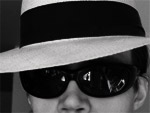More Self-Indulgent Blather

Week of: 01/29/2007
Abstract: I begin my ortho rotation; Five major assessments in seven days.
Mood: Quiet - introspective
What went well: I received an excellent grade on one of my exams and did well on others. I felt more at ease with my skills in clinical.
What needs work: I need to improve my organization before each exam: reduce retakes.
Elucidation: As I write this I'm studying for a Positioning and Related Anatomy exam slated to occur on Monday. First, before I continue I want to say, I know how lucky I am to be where I am, doing what I doing.
But golly, five big tests in seven days? It makes you wonder why the instructors couldn't get together a spread sheet calendar to show how the exams overlap. Grrrrr. Okay, now that I said it. Was it tough? You bet: I studied and worked and studied and worked some more. Everyone said the first Fall quarter is the toughest. We're taking ten didactic credits – in addition to being in clinical fifteen hours a week.
This week in ortho was fun. Although I had some family issues that provided heavy distraction, I pulled through with four comps: hand, pelvis etc. More importantly, I had a positive experience. The lead tech in orhto is very good with students. He challenges us within our abilities. For example, before assigning us an exam he'll say, which part of this exam do you feel comfortable trying to comp? I'm usually eager to do all of the projections, but I always want supervision, that is, until I double comp each one.
The problem is such supervision isn't always available. On a busy day, the techs are running around. I began a Os Calsis exam with out my usual routine to getting organized before beginning. I don't mean I didn't flash the proper size cassettes and think about technical factors, (mAs, kvp, sid, and collimation,) and positioning criteria. I did. I just didn't stop and put it all together mentally. Through this failure, I was able to see what is called for. Slow down, don't try to be a seasoned technologist after your first semester. Try to increase your speed at the things you feel confident.
Radiography is hard to learn. It's like riding a bike for the first time, while talking on the cell phone, and reading a newspaper. Don't believe me? The tech must take into consideration the girth of the pt, how rad (hot) the room is, how dense the tissue being imaged is, how much to collimate, how all the factors affect density and contrast, what is the CR angle in relationship to the IR, how will the source image distance produce a diagnostic image, what is the physician really requesting, ensure that the right pt and part are being imaged, & how does pt history affect the current exam? I could go on and fill a page, but that would be tedious.
I must somehow keep all those things organized in my mind before the exam. I don't want to appear hesitant with the patient. How do I do that? By being a sponge: asking the tech questions, imitating my role models, referring to my notes and taking notes in clinical, practicing in the lab at school. Doing everything with defined intention and attention. In short, increasing my confidence by acting like a good tech; one who pursues knowledge and skill in order to improve steadily.
Goals for next week:
Since I dropped two comps last week, I'm setting the goal to eight comps this week.
Work on all my interactions with patients, staff and fellow students.


2 Comments:
This may help you get a handle on remebering techniques. Get yourself a little address book. It should be small enough to fit in the pocket of your scrub shirt. It's great because the pages will be organized A-Z. Under "A" for instance, write down ankle techniques that work for you. Observe all techniques for all exams you witness. When you are using a phototimer the actual technique will appear on the control panel display after the exposure. Pay very close attention to this and record. Note the techniques used (by technologists you admire)on obese patients, kids, the eldery, varying pathology, SID's, even exams you haven't studied in school yet. In a couple of months you will have a great reference. When you find yourself under stress and unsure of what technique to use, just consult your little personal reference book. This will pay off greatly on stretcher exams when you must set a manual technique.
Start a notebook on all the little tricks you see at the hospital that you won't find in the books. On your long bus ride home from clinical, ask yourself, what did I learn today? What was that angle for the trauma mortise ankle? Where is the cassette positioned for a stretcher oblique knee, a backboard oblique c-spine? Write this stuff down and study it often. Watch experienced techs very closely, you can learn so much through keen observation.
Hi Anonymous: Wow! What great suggestions you've offered. I started with the address book idea from a tech at my clinical site. It's wonderful because of the size.
I've noted for example that some techs like to increase the SID on certain exams to reduce magnification
You're suggestion about watching the AEC, and techs I admire is valuable information that I'll use. I'll print out your words and reference them.
Post a Comment
<< Home